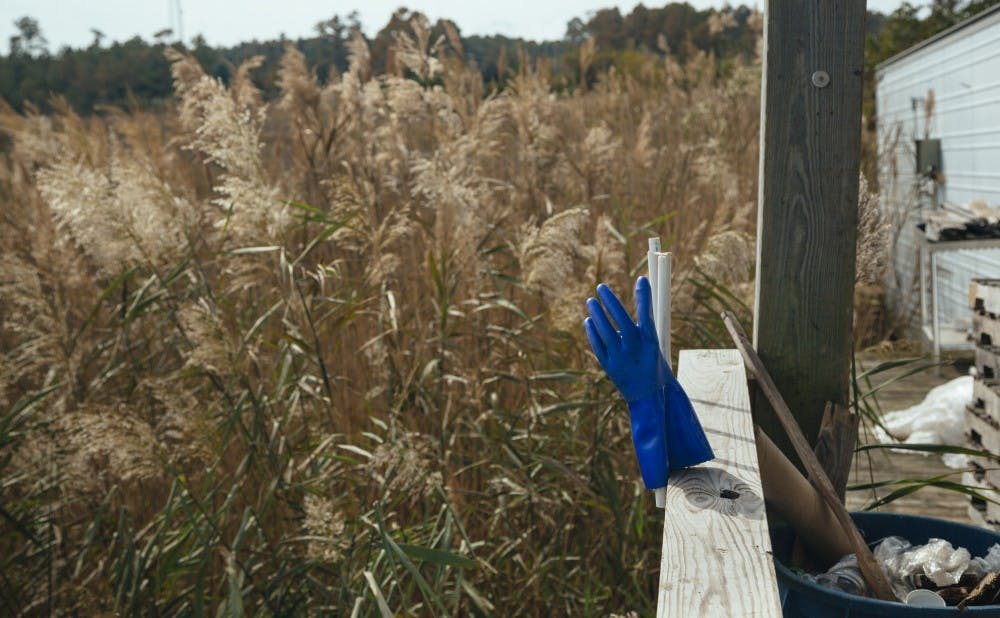Tuesday night, the Durham Co-op Market hosted the first of a series of film screening events. Visitors saw a short film called “Ugly & Wild: Learning to Love N.C. Fish.” Although it is only nine and a half minutes long, the film served as an introduction to the discussion of local, sustainable food. It features Locals Seafood, one of the Co-op’s seafood providers, telling the story of fish sourced and shipped in the area.
“We’re proud of ‘Ugly & Wild’ as offering a funny and educational introduction to this idea of trying species that you may be less familiar with but are just as delicious, if not more so, than your standard salmon and red snapper,” said D.L. Anderson, partner at Vittles Films. Anderson also directed, edited and filmed “Ugly & Wild.”
After the film, event attendees watched Locals Seafood representatives cook the “ugly” fish featured in the film and had the opportunity to purchase some as well.
Vittles Films partnered with the NC 10% Campaign to create the film. The campaign promotes local food sources through education and outreach and encourages those in North Carolina to spend at least 10 percent of their food budget on locally-sourced foods. The partnership thus fit with the goals of both groups.
“We make films exploring social issues through the lens of food,” Anderson said. “Food is a great pathway for telling stories about our culture and about issues.”
The Co-op intends to use the film screening series in a similar way, hosting panel discussions and providing a space for interaction between the community and the people featured in the films. This goal fit in with the store’s mission to be a positive force in the community, contribute to the local economy and treat the environment with care.
“As a co-op, we’re a lot more than just a grocery store,” Marketing Manager Germane James said. “We’re a grocery store with a bit of a mission.”
The Co-op is community-owned and community-focused. Anyone can become a owner by purchasing a share for a one-time payment of $100. Those who qualify for SNAP benefits are covered under the Co-op’s Food For All program, allowing them to become owners for a discounted rate of $15. James said owners receive monthly discounts and will receive dividend checks once the store becomes profitable. More owners also increases the ability of the Co-op to spread its values to a wider audience.
The second film in the series focuses on the value of “community connectedness.” The film does not have a title, but was produced by Duke’s Center for Documentary Studies and the Southwest Central Durham Quality of Life. It explores the history of the neighborhood the Co-op is in.
With this film, the Co-op hopes to spark conversation about the changes in the neighborhood around the store. James first heard of this film at a merchants association meeting.
“It was sort of a heavy moment to me because I feel like I would like to be the best business neighbor to the residents as we possibly can,” James said.
At the third and final event, the Co-op plans to show two films: “La Riojana Co-op and Food Co-op Impact,” which follows a cooperative from Argentina, and “Women in Coffee,” which features Equal Exchange, one of the Co-op’s coffee suppliers. Representatives from La Riojana will be at the event to interact and discuss with the community.
The message of each film in the series is important to the Co-op as an organization, as well as to its owners and customers, based on feedback from those groups. However, the goals of the events go beyond educating the community. The Co-op wants to have a new kind of social activity to build a sense of community around the store.
“This place is not afraid of being social,” James said. “I think it’s because the neighborhood kind of takes to it.”
Previous social events at the Co-op include a kombucha workshop, oyster roasts and Neighbor’s Day. They also have an ongoing health discussion series called “Health is Power.” The Thursday night $3 dinners have also turned into events due to the number of people and families, and the atmosphere that of fun and community that arises.
“That’s what we’re trying to create — a place where people feel like they can come and hang out, spend hours here and have a good time,” James said.
Get The Chronicle straight to your inbox
Sign up for our weekly newsletter. Cancel at any time.

